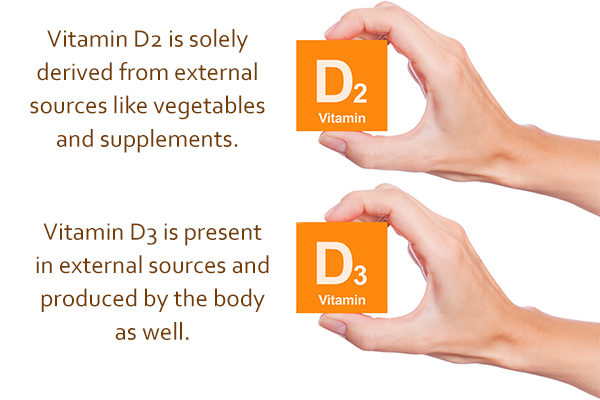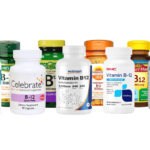What Is The Difference Between Vitamin D2 And Vitamin D3?

Vitamin D (also referred to as “calciferol”) is a fat-soluble vitamin that is naturally present in a few foods, added to others, and available as a dietary supplement. It is also produced endogenously when ultraviolet (UV) rays from sunlight strike the skin and trigger vitamin D synthesis.
Vitamin D obtained from sun exposure, foods, and supplements are biologically inert and must undergo two hydroxylations in the body for activation. Also, people with darker skin tend to have lower blood levels of vitamin D because the pigment (melanin) acts as a shade, reducing the production of vitamin D (and also reducing damaging effects of sunlight on the skin, including skin cancer).
Vitamin D promotes calcium absorption in the gut and maintains adequate serum calcium and phosphate concentrations to enable normal bone mineralization and to prevent hypocalcemic tetany (involuntary contraction of muscles, leading to cramps and spasms). It is also needed for bone growth and bone remodeling by osteoblasts and osteoclasts. Without sufficient vitamin D, bones can become thin, brittle, or misshapen. Vitamin D sufficiency prevents rickets in children and osteomalacia in adults. Together with calcium, vitamin D also helps protect older adults from osteoporosis.
Vitamin D has other roles in the body, including reduction of inflammation as well as modulation of such processes as cell growth, neuromuscular and immune function, and glucose metabolism. Many genes encoding proteins that regulate cell proliferation, differentiation, and apoptosis are modulated in part by vitamin D.
In foods and dietary supplements, vitamin D has two main forms, D2 (ergocalciferol) and D3 (cholecalciferol), that differ chemically only in their side-chain structures. Both forms are well absorbed in the small intestine. Absorption occurs by simple passive diffusion and by a mechanism that involves intestinal membrane carrier proteins. The concurrent presence of fat in the gut enhances vitamin D absorption, but some vitamin D is absorbed even without dietary fat. Neither aging nor obesity alters vitamin D absorption from the gut.
Vitamin D supplements are available in two forms: vitamin D2 (“ergocalciferol” or pre-vitamin D) and vitamin D3 (“cholecalciferol”).
What Is The Difference Between Vitamin D2 And Vitamin D3?
Vitamin D2 and Vitamin D3 are naturally occurring forms that are produced in the presence of the sun’s ultraviolet-B (UVB) rays, hence its nickname, “the sunshine vitamin. However, vitamin D2 (“ergocalciferol” or pre-vitamin D) is produced in plants and fungi while vitamin D3 (“cholecalciferol”) is produced in animals, including humans. Vitamin D2 and D3, differ chemically only in their side-chain structures. Both forms are well absorbed in the small intestine. Absorption occurs by simple passive diffusion and by a mechanism that involves intestinal membrane carrier proteins.
If you take excessive amounts of vitamin D supplements, you may get too much of it. However, this is unlikely to happen through diet or sun exposure because your body regulates the amount of vitamin D produced through sun exposure.
Vitamin D toxicity can lead to an increase in your blood calcium levels. This can result in a variety of health issues, such as:
- nausea
- apathy
- vomiting
- abdominal pain
- dehydration
- confusion
- increased thirst
Treatment includes stopping vitamin D intake and restricting dietary calcium. Your doctor might also prescribe intravenous fluids and medications, such as corticosteroids or bisphosphonates.
Taking 60,000 international units (IU) a day of vitamin D for several months has been shown to cause toxicity. This level is many times higher than the U.S. Recommended Dietary Allowance (RDA) for most adults of 600 IU of vitamin D a day.
Doses higher than the RDA are sometimes used to treat medical problems such as vitamin D deficiency, but these are given only under the care of a doctor for a specified time frame. Blood levels should be monitored while someone is taking high doses of vitamin D.
As always, talk to your doctor before taking vitamin and mineral supplements.





